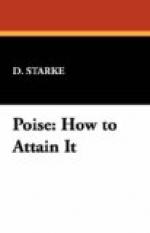He will not have to put up with the affront of being refused, for he will ask aid only of those persons who, for various reasons, he is practically sure will be of assistance to him. The knowledge of his own deserts, while keeping him in the position he has attained, will prevent him from being satisfied in commonplace surroundings, and his will-power will always maintain him at the level he has reached, permitting him no latitude save that of exceeding it.
Such is true poise, not that whose spirit one violates by merely associating it with the incapable, the pretentious, or the extravagant, but that which is at once the motive power and the inspiration of all the actions of those who, in their determination to force their way through the great modern struggle for existence, perseveringly follow a line of conduct that they have worked out for themselves in advance.
Ignoring such enterprises as they know to be unworthy of their powers, those who are possest of real poise (and not of that foolish temerity colloquially known as bluff) will devote themselves solely to such tasks as a well-ordered judgment and an accurate knowledge of their own potentialities indicate to them to be fitting.
Does this mean that they will succeed in every case?
Unfortunately, no! But such of them as have met with temporary failure, if they are able to assure themselves that their lack of success has been due neither to a failure of will-power nor a fear of ridicule, will return to the charge, once more prepared to make headway against circumstances which they have the poise to foresee, and which they will at least render incapable of harming them, even if they lack the necessary force to dominate them completely to their own advantage.
CHAPTER II
THE ENEMIES OF POISE
The enemies of poise are many and of different origins, both of feeling and of impulse.
They all tend, however, toward the same result, the cessation of effort under pretexts more or less specious.
It is of no use deceiving ourselves. Lack of poise has its roots deep in all the faults which are caused by apathy and purposeless variety.
We have learned in the previous chapter how greatly the vice of lack of confidence in oneself can retard the development of the quality we are considering.
Balanced between the desire to succeed and the fear of failure, the timid man leads a miserable existence, tortured by unavailing regrets and by no less useless aspirations, which torment him like the worm that dieth not.
Little by little the habit of physical inaction engenders a moral inertia and the victim learns to fly from every opportunity of escaping from his bondage.
Very soon an habitual state of idleness takes possession of him and causes him to avoid everything that tends to make action necessary.




